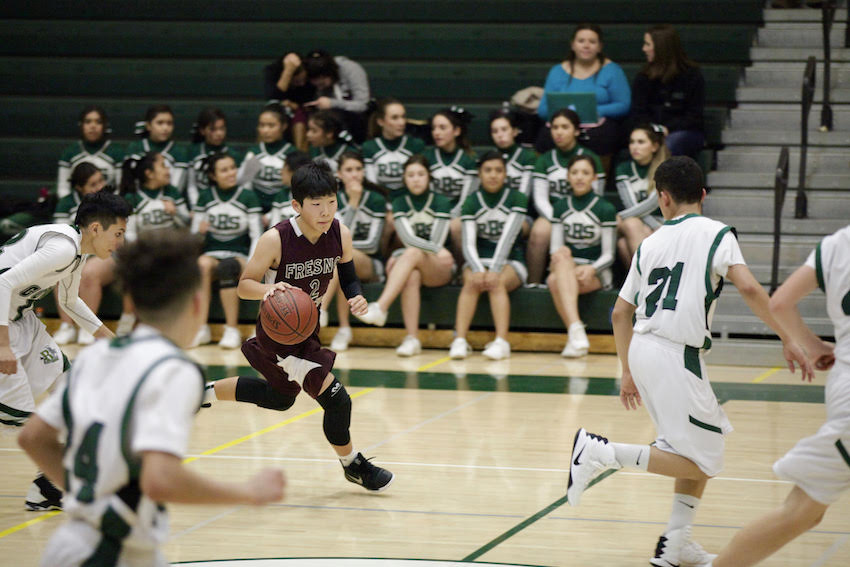Hispanic boy influences Kenneth Hu through struggles, joys, positive attitude
Senior Haiyang (Kenneth) Hu is an international student at Fresno Christian Schools and one of many participants in the AmeriStudent program. AmeriStudent LLC. works with incoming international students to secure a safe homestay and offer support through cultural and educational integration.

Life never gives everything that you want because the journey is often full of obstacles. But we can embrace it with a positive mindset and enjoy the ride. Be grateful for what you have and be optimistic toward difficulties.
“Thanksgiving is coming up, what are you planning on doing?” my friend asked during my freshman year (2016-’17) of high school.
I told him I hadn’t thought about it, but I was looking forward to this break. The first year coming to America for school gave me lots of challenges, often exhausting me mentally and physically.
I remember coming home and sitting down on the sofa thinking about where should I go for a vacation during the Thanksgiving break. Unexpectedly, my host mom walked towards me with a smile.
“We are going on a missionary trip to Mexico with the church,” she said. “It will last for two weeks. We will help a low-income family build a new cabin for themselves and spread Christianity.”
From previous experiences, I knew I couldn’t win the argument, so I accepted the reality. My leisurely vacation dream broke before it was even made.
Later that month, I went to Mexico with Mexico Caravan Minister (MCM). I was shocked and speechless by what was in front of me when I first arrived in the city of Tijuana. These traditional Mexican homes were made from a combination of clay-based soil, straw and water, only supported by a wood frame. Dusty air made it a bleak picture to look at and live in.
I knew many countries and regions are impoverished, but when I personally visited the village, it gave me an uncomfortable feeling. Everyone put their heart out there to serve; I felt proud of the whole group for working through a difficult situation.

I was most shocked by the family who had three children, living in a dusty house with a dirt floor. They call it home, where the broken walls surround a place of about 30 square meters.
The father of the family used to work in the United States, but his strange illness, the degeneration of his eyes, made it impossible for the architecture graduate to build a house for his own family. Compared with his helplessness, I found that my 11-hour drive was nothing to mention.
Two brand new wooden houses were built in less than three hours. The family served us handmade tacos and burritos. We sat down and had some conversation while eating the meal.
One of their children was named Brandon, a boy about 10 years old. He kicked an old soccer ball in front of me, and his smile depressed me.
I spent my time playing soccer with him all afternoon. Two branches on the ground set up the goal, playing one-on-one made the afternoon full of laughter and joy.
I painted his name on the wall of his new house with white paint and he spoke to me happily and excitedly in Spanish. At this time, my host mom, a lady who emigrated to the United States from Mexico, told me that Brandon just thanked me for building a new home for him.
I already knew before she told me because at that time, our communication through action was enough. Words seemed pale and powerless. The time flew by and the preacher gathered all of us together at the end.
We held each others’ hands and made a circle. “Whoever wants to pray for the family can do it,” the preacher said. “I will finish up the prayer.”
The silence came right after, and no one ever moved their lips to comment. I could not understand their silence.
I felt like I needed to say something about what I was thinking. Thirty seconds later, I broke the silence by giving thanks to everyone in the group and wishing God to help the family in the future.
I don’t believe in Christ, but I think saying God will at least bring them hope and my best wishes. If God is real, then he will take care of the rest.
In the following podcast, Kenneth Hu explain his struggles in adjusting to English language, American education and culture.
Somehow all the memories when I left China as a 15-year-old came back to my mind; the day I left home was just like yesterday.
My mother was in a panic about everything. “Did you bring your charger? How about your medicine? Don’t do anything stupid and respect the elders.”

I remember saying, “I know all these, mom, don’t worry,” after hearing her rant it too many times.
I was excited, scared and depressed at the same time. I tried to look tough and put a smile on my face because I was afraid that my mother would be worried.
After I received the plane ticket, my father simply told me to do well at school, but my mother became increasingly emotional. Immediately, I felt a chip on my shoulder. I am not a kid anymore. I grabbed my mom and gave her a big hug tried to calm her down, then walked to the airport security and checked in.
Now the journey began: leaving home to a new country to study at the age of 15; my English was broken. This was the first time I got on an 13-hour flight by my own. I questioned the decision to study abroad in my mind.
On the airplane, I looked for something to kill my time, and ended up opening a documentary called “The Taste Of China” on the aircraft entertainment system. In the show, a family was shopping at the market for food to prepare for the Chinese New Year, the biggest and most important traditional festival in China.
Watching it took me into a time machine as an elementary school kid.
“Is it heavy? You need help or you can be the man of the house now?” my mother asked me and smiled while walking home from the grocery store.
“Of course I can, but why do we buy so much food? It’s almost enough for a month,” I asked curiously.
“Because tomorrow is New Year’s Eve,” she explained patiently. “No shops or stores will be open. Everyone is staying home with their family for a month.”

A stewardess interrupted my delusion.
“Do you need any water, tea or coffee, sir?” I asked for a water and kept watching the show.
The street is bustling, you can hear the firecrackers everywhere, louder than thunder. Firecrackers have a history lasting more than two thousand years in China during the Spring Festival (Chinese New Year).
I remember asking my mom when I was a kid, “Why does everyone light firecrackers?”
My mother explained that a long time ago there was a kind of animal called Nian, which would come out to harm the people before New Year’s Eve. Later, people found that when bamboo knots were burned in front of the house or red objects were pasted outside the house, the annual beast would be frightened away.
From then on, every New Year’s Eve families put up red couplets and set off firecrackers.
For most Chinese families, the New Year’s Eve dinner is the most important meal of the year.
All the days preparing for this big meal are always worth it. With countless delicious traditional Chinese dishes on the table, it’s hard to pick which one your chopsticks go to first.
One dish always lingers in my mind: braised fish in soy sauce. If I had to pick a taste for The Spring Festival, this would probably be it. In China, people don’t finish their meal, to show that we will always have more than what we need.
I really enjoyed watching this documentary, but when it ends with a family smiling in the last scene, my heart suddenly ached for a second. In that moment, I realized I am not able to spend the next eight Spring Festivals with my family in China due to school. I don’t remember the last time I cried, but I am sure in that moment my tears were uncontrollable.

Brandon’s life is full of struggles, but a poor living situation, lack of opportunities and little materials has never brought him down. An old soccer ball is all he needs to have fun in the afternoon.
On the airplane, I thought studying in America was depressing and I felt pity for myself. However, I changed my mind after meeting Brandon. He might never get a chance to study in America or even leave his country.
In the end, I realized that we all have unique personal struggles in our life. Brandon encourages me to take on the challenges in my life, find joy in little things and utilize my opportunity to study in America instead of wasting time and complaining. Struggles are hard to swallow, but we should never let it bring us down and strive for greatness.
Haiyang (Kenneth) Hu is an international student from Huizhou, Guangdong province, China. Huizhou lies in the southern part of China, in the southeast portion of Guangdong. Huizhou’s two pillar industries are petrochemicals and electronic information, which together account for 57% of the output (in value-added terms) of all industrial enterprises above a designated size in 2017.
For another international student column, check out COLUMN: Language barrier, culture, grandparent death shape international student. For more articles, read 35th annual homecoming unifies community, supports local nonprofit or Royal Battle showcases dance skills, creates friendly competition.
Kenneth Hu can be reached via email.





